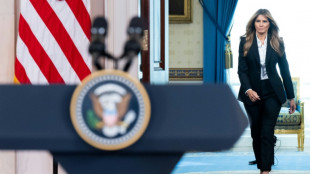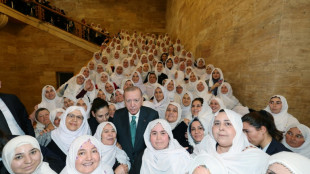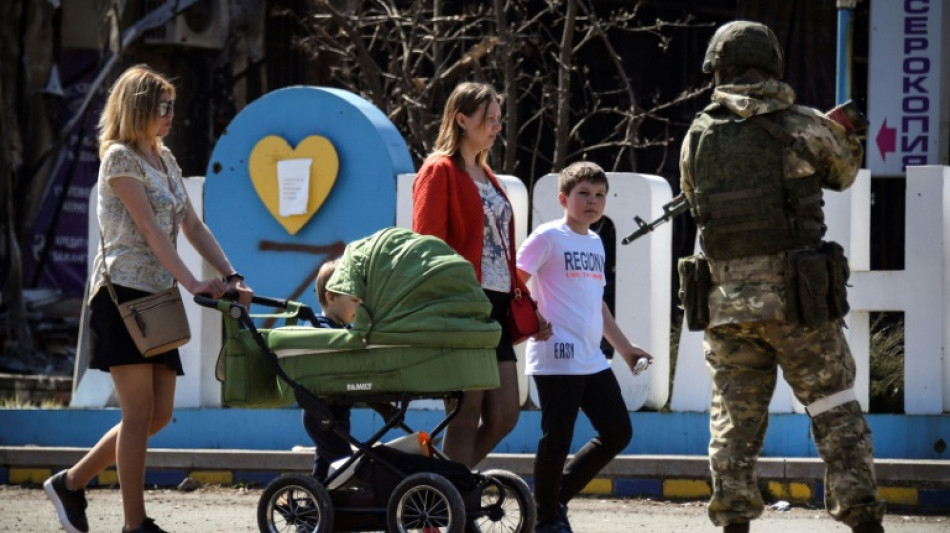
-
 Underdogs Wales could hurt Irish after Scotland display: Popham
Underdogs Wales could hurt Irish after Scotland display: Popham
-
Gilgeous-Alexander rules over Knicks again in Thunder win

-
 Hamilton reveals sequel in the works to blockbuster 'F1: The Movie'
Hamilton reveals sequel in the works to blockbuster 'F1: The Movie'
-
Alonso, Stroll fear 'permanent nerve damage' from vibrating Aston Martin

-
 China boosts military spending with eyes on US, Taiwan
China boosts military spending with eyes on US, Taiwan
-
Seoul leads rebound across Asian stocks, oil extends gains

-
 Tourism on hold as Middle East war casts uncertainty
Tourism on hold as Middle East war casts uncertainty
-
Bayern and Kane gambling with house money as Gladbach come to town

-
 Turkey invests in foreign legion to deliver LA Olympics gold
Turkey invests in foreign legion to deliver LA Olympics gold
-
Galthie's France blessed with unprecedented talent: Saint-Andre

-
 Voice coach to the stars says Aussie actors nail tricky accents
Voice coach to the stars says Aussie actors nail tricky accents
-
Rahm rejection of DP World Tour deal 'a shame' - McIlroy

-
 Israel keeps up Lebanon strikes as ground forces advance
Israel keeps up Lebanon strikes as ground forces advance
-
China prioritises energy and diplomacy over Iran support

-
 Canada PM Carney says can't rule out military participation in Iran war
Canada PM Carney says can't rule out military participation in Iran war
-
Verstappen says new Red Bull car gave him 'goosebumps'

-
 Swiss to vote on creating giant 'climate fund'
Swiss to vote on creating giant 'climate fund'
-
Google to open German centre for 'AI development'

-
 Winter Paralympics to start with icy blast as Ukraine lead ceremony boycott
Winter Paralympics to start with icy blast as Ukraine lead ceremony boycott
-
Sci-fi without AI: Oscar nominated 'Arco' director prefers human touch

-
 Ex-guerrillas battle low support in Colombia election
Ex-guerrillas battle low support in Colombia election
-
'She's coming back': Djokovic predicts Serena return

-
 Hamilton vows 'no holding back' in his 20th Formula One season
Hamilton vows 'no holding back' in his 20th Formula One season
-
Two-thirds of Cuba, including Havana, hit by blackout

-
 US sinks Iranian warship off Sri Lanka as war spreads
US sinks Iranian warship off Sri Lanka as war spreads
-
After oil, US moves to secure access to Venezuelan minerals

-
 Arteta hits back at Brighton criticism after Arsenal boost title bid
Arteta hits back at Brighton criticism after Arsenal boost title bid
-
Carrick says 'defeat hurts' after first loss as Man Utd boss

-
 Ecuador expels Cuba envoy, rest of mission
Ecuador expels Cuba envoy, rest of mission
-
Arsenal stretch lead at top of Premier League as Man City falter

-
 Title race not over vows Guardiola after Man City held by Forest
Title race not over vows Guardiola after Man City held by Forest
-
Rosenior hails 'world class' Joao Pedro after hat-trick crushes Villa

-
 Brazil ratifies EU-Mercosur trade deal
Brazil ratifies EU-Mercosur trade deal
-
Real Sociedad edge rivals Athletic to reach Copa del Rey final

-
 Chelsea boost top four push as Joao Pedro treble routs Villa
Chelsea boost top four push as Joao Pedro treble routs Villa
-
Leverkusen sink Hamburg to keep in touch with top four

-
 Love match: WTA No. 1 Sabalenka announces engagement
Love match: WTA No. 1 Sabalenka announces engagement
-
Man City falter as Premier League leaders Arsenal go seven points clear

-
 Man City title bid rocked by Forest draw
Man City title bid rocked by Forest draw
-
Defending champ Draper ready to ramp up return at Indian Wells

-
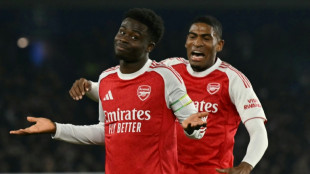 Arsenal extend lead in title race after Saka sinks Brighton
Arsenal extend lead in title race after Saka sinks Brighton
-
US, European stocks rise as oil prices steady; Asian indexes tumble
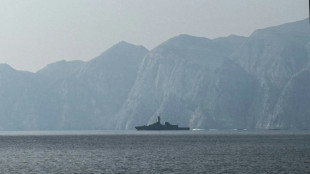
-
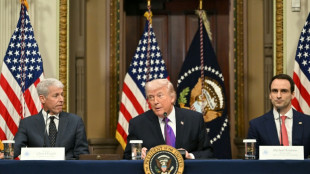 Trump rates Iran war as '15 out of 10'
Trump rates Iran war as '15 out of 10'
-
Nepal votes in key post-uprising polls
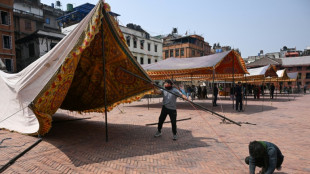
-
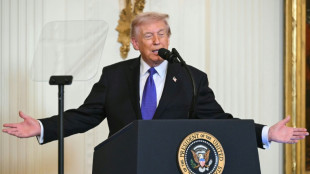 US Fed warns 'economic uncertainty' weighing on consumers
US Fed warns 'economic uncertainty' weighing on consumers
-
Florida family sues Google after AI chatbot allegedly coached suicide

-
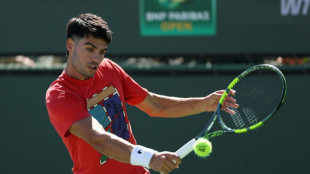 Alcaraz unbeaten run under threat from Sinner, Djokovic at Indian Wells
Alcaraz unbeaten run under threat from Sinner, Djokovic at Indian Wells
-
Iran's supreme leader gone, but opposition still at war with itself
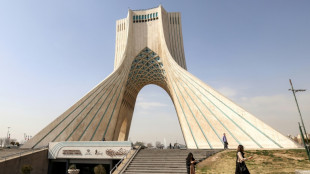
-
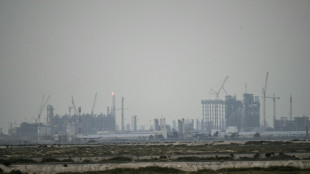 Mideast war rekindles European fears over soaring gas prices
Mideast war rekindles European fears over soaring gas prices
-
'Miracle to walk' says golfer after lift shaft fall


'Russia, our sacred state!': school reopens under Moscow control
In the playground of a school in the war-torn eastern Ukrainian town of Volnovakha, now under Moscow's control, children listen to a recording of the Russian anthem, watched by armed soldiers.
Several dozen pupils have lined up outside for a formal "back to school" ceremony, a month after the town was taken by Russian troops and Moscow-backed separatists.
Volnovakha has no electricity or working telephone lines, AFP journalists found while taking part in a media trip organised by the Russian army.
Widespread shelling has destroyed houses, shops and cafes, evidence of the fierce fighting for a town strategically located halfway between the main regional city of Donetsk and the port of Mariupol.
Russian troops have besieged Mariupol for a month and a half and the city on the Sea of Azov seems likely to fall shortly.
As Russia puts it, Volnovakha has been "liberated" from neo-Nazi Ukrainians.
"It's time to learn. Hurry up, children!" a small rosy-cheeked girl with white bows in her hair announces, speaking into a microphone.
Behind her, the school staff are standing next to a Russian flag and that of the separatist Donetsk People's Republic (DNR).
Nearby a soldier in a cagoule and helmet -- one of the troops accompanying the journalists -- stands watching, holding a submachine gun.
As a sound system plays the DNR anthem and then the Russian anthem -- which opens "Russia, our sacred state, Russia, our beloved country!" -- staff and pupils stand silently, their faces impassive.
- 'Lived through horror' -
Russia's conquest of Volnovakha on March 11 allowed its forces to encircle Mariupol from the north, having attacked the strategic Sea of Azov port from the east and west.
This came after Volnovakha and its Ukrainian defending troops were bombarded for two weeks.
Many houses, shops and public buildings are now semi-ruined, windowless or burnt-out.
Russia argues that such destruction here, and elsewhere in Ukraine, came about because Kyiv's forces used the local population as human shields.
After a month under Moscow's control, there are still scenes of devastation all around. There is a huge hole in the facade of the hospital and trees nearby have been snapped in half.
Yellow-painted School Number 5, which is in the centre of the town, has also suffered from shelling, with gaping holes in place of several windows and shattered bricks. This is the only school to reopen so far.
"We lived through horror. There was terrible bombing," says Lyudmila Khmara, the 52-year-old school administrator.
She says that she wants to stay in Volnovakha, all the same, because: "nowhere is as good as home".
She says she hopes Volnovakha will become "part of Russia", where no one will be forced to speak Ukrainian, while this part of Ukraine is overwhelmingly Russian-speaking.
Moscow justifies its military operation in Ukraine citing the need to protect the Russian-speaking population.
- In survival mode -
The army is leaving nothing to chance. Even with no sign of resistance, tanks and military vehicles decorated with the letter Z patrol the streets as local civilians walk around and cycle.
The municipal hospital continues to function as best it can, despite lacking electricity and suffering extensive bomb damage.
In the semi-darkness, a nurse, 46-year-old Natalya Nekrasova-Mukhina, says that most patients, from children to the elderly, come to be treated for shrapnel wounds.
Local residents are still living in survival mode.
"We have no gas, no water, no electricity and no phone line. We live like we're in a hole," says Lyudmila Dryga, 72, a retired crane operator.
Another local woman, Svetlana Shcherbakova, 59, recounts how she lost everything except ID documents when her house burned down.
"We received humanitarian aid just once, that was it," says the former supermarket security manager, her voice trembling.
A 35-year-old railway mechanic, Anton Varusha, estimates that less than half of the people living on his street have returned to live in Volnovakha, which had around 20,000 inhabitants before the bombardment.
"I don't know yet whether I'll stay here. At the moment, I have my parents here, who are old and sick," he says.
He says locals are struggling to get information on what is happening, with no electricity or internet.
"We try to listen to various radio stations, so we can somehow compare (accounts of) what is going on," he says.
A.Gasser--BTB

